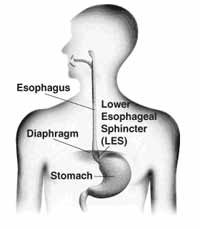What causes reflux?
After swallowed food travels down the esophagus, it stimulates cells in the stomach to produce acid and pepsin (an enzyme), which aid digestion. A band of muscle at the lower part of the esophagus, called the lower esophageal sphincter (LES), acts as a barrier to prevent the back-flow (reflux) of stomach contents into the esophagus. The LES normally relaxes to allow swallowed food to pass into the stomach.
Reflux occurs when that barrier is relaxed at inappropriate times, is weak, or is otherwise compromised. Factors like distention of the stomach, delayed emptying of the stomach, large sliding hiatal hernia, or too much acid in the stomach can also make it easier for acid reflux to occur.
What causes GERD?
There is no known single cause of gastroesophageal reflux disease (GERD). It occurs when the esophageal defenses are overwhelmed by gastric contents that reflux into the esophagus. This can cause injury to tissue. GERD can also be present without esophageal damage (approximately 50 – 70% of patients have this form of the disease).
Gastroesophageal reflux occurs when the LES barrier is somehow compromised. Occasional reflux occurs normally, and without consequence other than infrequent heartburn, in people who do not have GERD. In people with GERD, reflux causes frequent symptoms or damages the esophageal tissue.
Some, but not all, people with hiatal hernia have GERD and vice versa. Hiatal hernia occurs when a part of the stomach moves above the diaphragm, from the abdominal to the chest area. The diaphragm is a muscle that separates the chest (containing the esophagus) from the abdomen (containing the stomach). If the diaphragm is not intact, it can compromise the ability of the LES to prevent acid reflux. A hiatal hernia may decrease the sphincter pressure necessary to maintain the anti-reflux barrier.
Even when the LES and the diaphragm are intact and functioning normally, reflux can still occur. The LES may relax after having large meals leading to distension of the upper part of the stomach. When that happens there is not enough pressure at the LES to prevent reflux. In some patients the LES is too weak or cannot mount enough pressure to prevent reflux during periods of increased pressure within the abdomen.
The extent of injury to the esophagus – and the degree of severity of GERD – depends on the frequency of reflux, the amount of time the refluxed material stays in the esophagus, and the quantity of acid in the esophagus.
Adapted from IFFGD Publication: GERD Questions and Answers. Revised 2010 by Ronnie Fass, MD, Chair, Division of GI and Hepatology, Metro Health Medical Center, Cleveland, OH. Original Contributors: Joel E. Richter, MD, Philip O. Katz, MD, and J. Patrick Waring, M.D. Editor: William F. Norton, International Foundation for Functional Gastrointestinal Disorders, Milwaukee, WI.








